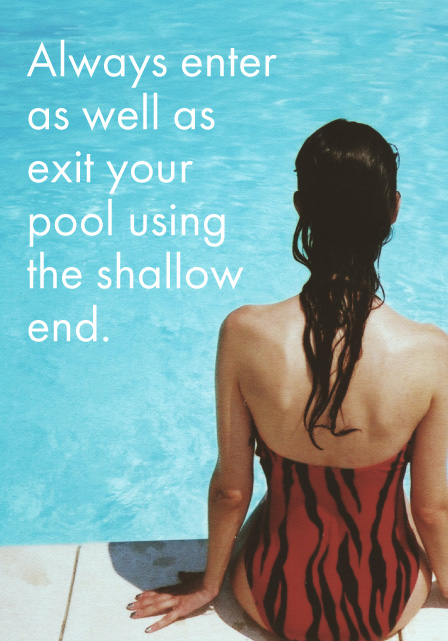Precautions For Swimming Pool Owners Who Have A Heart Condition
Do you have a heart condition? If you do, then you may be worried about how it might affect your pool use. Can you use a fibreglass pool when you have a heart condition? What if you already owned a pool before you were diagnosed with your heart condition? Should you stop using it altogether?

You should always discuss with your doctor whether you should swim with your heart condition or not. They will let you know whether you should go swimming or not. If they do give you permission, then you should always ensure that your GTN spray is near you at all times. It’s important to note that medical conditions tend to vary from person to person.
This is why you should always consult your doctor, regarding whether you can go swimming or not. There are plenty of benefits associated with swimming, even if you have a heart condition. When you swim regularly, you can ensure that your joints are supple and that your muscles are strong. You can also lose weight when you go swimming regularly.
Swimming with a heart condition
People who have heart conditions should note that being in the water can have certain effects on their bodies. These effects can be greater in people who have angina or other heart conditions. When you’re in the water, your heart will need to work harder than when you aren’t in it. This could result in changes to your circulation, meaning that more blood could possibly be returning to the heart area. Once you draft to exercise, your heart will need to work harder.
Add the resistance of the pool water to this, and your body needs to work much harder than if you were exercising outside your pool. If you’re in deeper water, then you’ll feel these effects even more.
Since your body will be buoyant in the water, and the water temperature can be different as well, you may end up underestimating how hard your body actually has to work. This is why if you have a heart condition, you’ll need to exercise at an intensity that is much lower than should you have been exercising outside the water.

What kind of water temperature should you swim in?
The temperature of the water in your fibreglass pool, when you go swimming in it, should be between 26 and 33C. This is between 79 and 91F. Water, when it’s in this range, will have the least amount of effect on your heart. Usually, public pools tend to be regulated to be at around 29C (84F). Should the pool be hotter than 33C, then your blood pressure could end up dropping when you exercise in your pool.
As a result, you could end up feeling either lightheaded or even faint. You could also experience heart rhythms that are irregular, by swimming in a pool where the water isn’t optimal for your condition.
Also, note that you should only go swimming when you feel good. If you feel unwell at any time, avoid swimming in your fibreglass pool. If you’ve just had a meal, then wait for at least an hour before you enter your fibreglass pool.
Using your pool when you have a heart condition
Always enter as well as exit your pool using the shallow end. This will allow you to get used to both the temperature, as well as the depth of the pool. You should also warm up before you use your pool. After using it, there should be a cooling down period as well.
When you start swimming, do it at a slow pace. Then, build up your pace with time. Gradually, start to lower your pace again, before you exit your pool. As for the swimming stroke that is best for you, should you have a heart condition, the answer is that it depends.
Usually, you’ll find that the swimming stroke that you’re most familiar with is the one that you should consider using. You should never hold your breath as you’re swimming when you have a heart condition. This is why you shouldn’t go underwater when you’re swimming. You can also consider putting water features into the pool that will help with relaxation so swimming is more stress free.
Avoid keeping the water in your face for long periods of time, as this can strain your heart as well. In case you ever find yourself experiencing chest pain, lightheadedness, or even heart palpitations, you should stop swimming. If you find that your symptoms aren’t going away even after you’ve stopped swimming, then you’ll need to make use of your GTN spray. You should also get in touch with your doctor as soon as you can.

Is it safe to use your swimming pool when you have a heart condition?
As long as you monitor your health and ensure that you’re feeling good at all times, you can safely use your fibreglass pool. There are several health benefits that you can experience when you go swimming on a regular basis.
Even when you have a heart condition, swimming can still help you stay fit. You’ll need to ensure that you’re taking it easy while you’re swimming and that you don’t start exercising suddenly. Do some warm-up exercises before you enter your pool. This will help you get your body ready to go swimming. When in the pool, try to stay near the shallow end. If you want to go to the deep end, then ensure there is someone available who can help you if necessary. If you want to swim at night, make sure you take the appropriate safety measures.
Ideally, another family member should be near the pool area, monitoring you while you use your pool. As long as you take the necessary precautions while using your pool, you’ll be able to use it without it affecting your health in any way.
Conclusion
Even if you have a heart condition, you should still be able to use your pool. You’ll need to monitor your health before and while you use your pool. If you feel any kind of discomfort, then get out of the pool immediately. Try to ensure that a family member is nearby while you use your pool. By taking the necessary precautions, you can enjoy using your fibreglass pool without facing any problems.
Precautions For Swimming Pool Owners Who Have A Heart Condition
Do you have a heart condition? If you do, then you may be worried about how it might affect your pool use. Can you use a fibreglass pool when you have a heart condition? What if you already owned a pool before you were diagnosed with your heart condition? Should you stop using it altogether?

You should always discuss with your doctor whether you should swim with your heart condition or not. They will let you know whether you should go swimming or not. If they do give you permission, then you should always ensure that your GTN spray is near you at all times. It’s important to note that medical conditions tend to vary from person to person.
This is why you should always consult your doctor, regarding whether you can go swimming or not. There are plenty of benefits associated with swimming, even if you have a heart condition. When you swim regularly, you can ensure that your joints are supple and that your muscles are strong. You can also lose weight when you go swimming regularly.
Swimming with a heart condition
People who have heart conditions should note that being in the water can have certain effects on their bodies. These effects can be greater in people who have angina or other heart conditions. When you’re in the water, your heart will need to work harder than when you aren’t in it. This could result in changes to your circulation, meaning that more blood could possibly be returning to the heart area. Once you draft to exercise, your heart will need to work harder.
Add the resistance of the pool water to this, and your body needs to work much harder than if you were exercising outside your pool. If you’re in deeper water, then you’ll feel these effects even more.
Since your body will be buoyant in the water, and the water temperature can be different as well, you may end up underestimating how hard your body actually has to work. This is why if you have a heart condition, you’ll need to exercise at an intensity that is much lower than should you have been exercising outside the water.

What kind of water temperature should you swim in?
The temperature of the water in your fibreglass pool, when you go swimming in it, should be between 26 and 33C. This is between 79 and 91F. Water, when it’s in this range, will have the least amount of effect on your heart. Usually, public pools tend to be regulated to be at around 29C (84F). Should the pool be hotter than 33C, then your blood pressure could end up dropping when you exercise in your pool.
As a result, you could end up feeling either lightheaded or even faint. You could also experience heart rhythms that are irregular, by swimming in a pool where the water isn’t optimal for your condition.
Also, note that you should only go swimming when you feel good. If you feel unwell at any time, avoid swimming in your fibreglass pool. If you’ve just had a meal, then wait for at least an hour before you enter your fibreglass pool.
Using your pool when you have a heart condition
Always enter as well as exit your pool using the shallow end. This will allow you to get used to both the temperature, as well as the depth of the pool. You should also warm up before you use your pool. After using it, there should be a cooling down period as well.
When you start swimming, do it at a slow pace. Then, build up your pace with time. Gradually, start to lower your pace again, before you exit your pool. As for the swimming stroke that is best for you, should you have a heart condition, the answer is that it depends.
Usually, you’ll find that the swimming stroke that you’re most familiar with is the one that you should consider using. You should never hold your breath as you’re swimming when you have a heart condition. This is why you shouldn’t go underwater when you’re swimming. You can also consider putting water features into the pool that will help with relaxation so swimming is more stress free.
Avoid keeping the water in your face for long periods of time, as this can strain your heart as well. In case you ever find yourself experiencing chest pain, lightheadedness, or even heart palpitations, you should stop swimming. If you find that your symptoms aren’t going away even after you’ve stopped swimming, then you’ll need to make use of your GTN spray. You should also get in touch with your doctor as soon as you can.

Is it safe to use your swimming pool when you have a heart condition?
As long as you monitor your health and ensure that you’re feeling good at all times, you can safely use your fibreglass pool. There are several health benefits that you can experience when you go swimming on a regular basis.
Even when you have a heart condition, swimming can still help you stay fit. You’ll need to ensure that you’re taking it easy while you’re swimming and that you don’t start exercising suddenly. Do some warm-up exercises before you enter your pool. This will help you get your body ready to go swimming. When in the pool, try to stay near the shallow end. If you want to go to the deep end, then ensure there is someone available who can help you if necessary. If you want to swim at night, make sure you take the appropriate safety measures.
Ideally, another family member should be near the pool area, monitoring you while you use your pool. As long as you take the necessary precautions while using your pool, you’ll be able to use it without it affecting your health in any way.
Conclusion
Even if you have a heart condition, you should still be able to use your pool. You’ll need to monitor your health before and while you use your pool. If you feel any kind of discomfort, then get out of the pool immediately. Try to ensure that a family member is nearby while you use your pool. By taking the necessary precautions, you can enjoy using your fibreglass pool without facing any problems.


